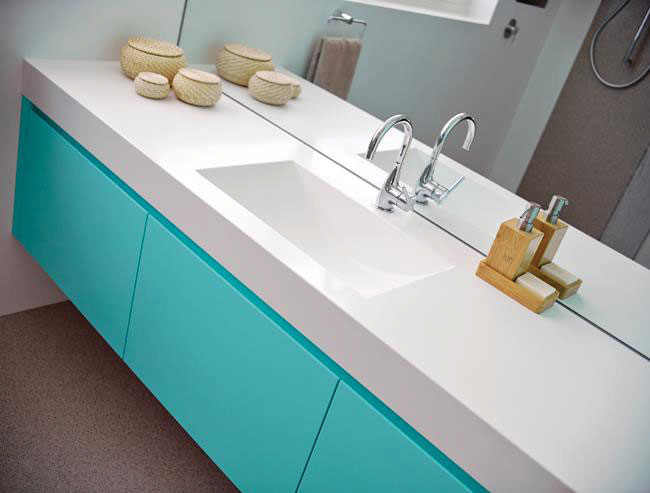Quartz has long reigned as the go-to material for countertops and surfaces in residential and commercial spaces. Its durability, low maintenance, and wide range of designs have made it a popular choice among homeowners and designers alike. However, there is a new contender on the scene that is making a strong comeback: Solid Surface. With its unique properties and growing popularity, Solid Surface is gaining recognition, particularly in the medical industry, where hygiene and cleanability are of utmost importance.
Solid Surface, as the name suggests, is a solid, non-porous material that is primarily composed of acrylic, polyester resins, and natural minerals. It was first introduced in the 1960s but gained significant attention and market share in the 1970s with brands like Corian, Avonite, and HiMacs leading the way. Solid Surface quickly became known for its versatility, seamless appearance, and easy maintenance. However, with the emergence of Quartz in the 1990s, Solid Surface experienced a decline in popularity.
Fast forward to the present day, and Solid Surface is making a strong comeback. One of the key reasons for this resurgence is its extensive use in the medical industry. In medical settings, maintaining a hygienic environment is crucial, and Solid Surface excels in this regard. Its non-porous nature prevents the absorption of liquids and the growth of bacteria, making it highly resistant to stains, odors, and the transmission of pathogens. The seamless construction of Solid Surface further enhances its cleanability, as there are no joints or seams where germs can hide and proliferate.
Corian, Avonite, and HiMacs are among the most popular brands of Solid Surface available in the market today. Corian, introduced by DuPont, has been a leading choice for decades. It offers a wide variety of colors and patterns, allowing for endless design possibilities. Avonite, known for its aesthetic appeal and durability, is another trusted brand in the Solid Surface realm. HiMacs, produced by LG Hausys, is highly regarded for its exceptional strength, thermoformability, and seamless integration capabilities.
Apart from its hygienic properties, Solid Surface offers repairability, meaning that minor scratches or dents can be easily repaired, restoring the surface to its original state. Additionally, Solid Surface is highly customizable, allowing for unique shapes, designs, and edge profiles. This level of customization gives architects and designers the freedom to create bespoke surfaces that cater to their clients’ specific needs and preferences.
Another advantage of Solid Surface is its renewable nature. In cases of heavy wear or damage, the surface can be sanded down and refinished, extending its lifespan and reducing the need for replacement. This not only makes Solid Surface an environmentally friendly choice but also provides long-term cost savings.
While Solid Surface has made significant strides, it is important to note that Quartz still holds a firm grip on the market. Quartz surfaces offer natural beauty, exceptional durability, and resistance to heat and scratches. Its popularity continues to soar, especially among homeowners who prioritize a high-end aesthetic.
In conclusion, again, while Quartz remains the king of countertops and surfaces. Solid Surface presents a compelling choice for those seeking both functionality and aesthetics. As the competition between Quartz and Solid Surface heats up, consumers can look forward to a wider array of choices and innovations in the world of surface materials.

